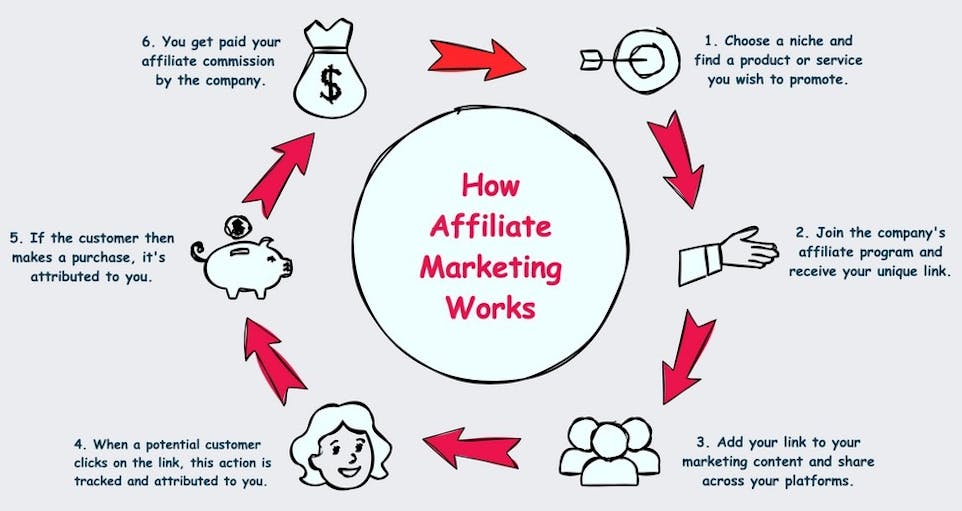You’ve probably read stories about people making money online while they travel the world — or even while they sleep.
And perhaps you think this sounds too good to be true — or at least only happens to those who are younger, richer and more tech-savvy than you.
But here's the truth: you don’t need to be a tech expert, have a big budget or create your own product to get started.
With affiliate marketing, you promote products or services that already exist and earn commissions when people buy through your recommendations. This means, if you’re new to online business, you can focus on learning the skills you need to market these products and services, rather than first having to create or source something to sell.
If you’ve ever thought, I’m too old to learn something new or I don’t know anything about running an online business, let me assure you: affiliate marketing is beginner-friendly and can work for people of all ages and from all walks of life. When done right, it can give you the financial and time freedom you’ve been dreaming of.
I know this because I’m following this path myself. However, although I now can see affiliate marketing is the easiest way to start an online business, it wasn’t always that way. In my quest to create the freedom I yearned for in retirement, I wasted time and money scouring the internet for fast ways to build an online business and even succumbed to dubious get-rich-quick schemes. I spiralled down rabbit holes of false opportunities and became confused and overwhelmed by all the options out there.
So my aim with this Affiliate Marketing Guide is to save you from repeating the mistakes I made by sharing the truths I wish I’d known when I started.
Curious to learn more? Then let’s get going…
I’m Alison, a traveller, freelancer and now an online business owner. Like many of you, I spent decades juggling work, family and a yearning for freedom. For me, freedom meant being able to explore the world without worrying about work deadlines or financial constraints.
I’ve been passionate about travel ever since I took an extended work break 30 years ago to pursue my dream of visiting South America. I had some incredible experiences, hiking in snow-capped mountains and glaciers, getting up close to penguins, taking a helicopter ride over the majestic Iguazu Falls, and ending my trip in spectacular style at Brazil’s Rio Carnival.
Returning half-heartedly to my job in magazine publishing, I resolved to fit as much travel as possible into my life going forward. So, I switched from full-time employment to freelance work so I’d have more time to explore the world.
This led to me taking a 'grown-up' gap year in my early 40s, travelling across five continents on a round-the-world ticket. I remember sitting on an idyllic beach in Thailand one Monday morning, pinching myself that back home my friends were just beginning their working week.
I returned to work and family life, balancing my passion for travel with raising my daughter. But that memory of carefree travel and a curiosity to discover more of our amazing planet never left me, and I was determined to spend my retirement seeking more adventures across the world.
But as I approached my 60s, I realised something: my freelance income wouldn’t sustain the life I dreamed of in retirement. I wanted more flexibility — work that didn’t tie me to deadlines or clients.
Then the pandemic hit, and my freelance work in events marketing dried up. While it was a challenging time, it forced me to rethink how I could build an income without sacrificing the flexibility I craved.
I knew that creating a passive income through my own online business could be the way forward but didn’t know where to start. So I searched on Google and YouTube for solutions but was overwhelmed by all the possibilities.
Increasingly frustrated and ready to give up, I was then fortunate to discover the online business education program I’m now using to build my brand. Although this platform teaches different ways to earn online, I decided to start with affiliate marketing.
Here’s why it stood out for me:
• Low start-up costs: I didn’t need to invest heavily to get started.
• No product required: I could promote existing products, saving me time and effort.
• Scalable income: The potential to build a business that earns even when I’m not working.
• Fits my lifestyle: It’s flexible enough to work from anywhere, even a beach in Thailand!

Affiliate marketing is a simple business model where you earn a commission by promoting someone else’s products or services. Here’s how it works:
1. Join an affiliate program: You partner with a company that offers products or services that align with your interests.
2. Get your unique affiliate link: This tracks leads and sales back to you.
3. Promote the product or service: You share your link and create relevant, engaging content through blogs, social media, email and ads.
4. Earn commissions: You get paid every time someone clicks your link and buys.
The beauty of this model is that you don’t have to handle inventory, customer service or shipping. Your role is simply to connect people with solutions that genuinely help them.
However, although affiliate marketing is beginner-friendly, there are a few steps to making it work. But learning the skills and strategies to succeed as an affiliate can give you the expertise and confidence to create any business online, attract customers to it and enjoy the financial security of earning an income on your terms.
Learning curve: As with any online business, you’ll need to learn some digital marketing skills and tools. However, investing in proper training can speed this up and provide valuable support when you encounter challenges along the way.
Some effort at the start: Building a successful affiliate business is not an overnight process. You’ll require patience, commitment and focus to prepare and launch your business and set it up for growth and success.
Competition: Because affiliate marketing is a popular way to earn online, you’ll face competition from other affiliate marketers. Popular niches can be crowded so it’s important to identify an area where you can differentiate yourself and stand out.
No product control: Although having a ready-made solution is a key appeal of affiliate marketing, this means you have no control over the quality of the products or services you promote so quality issues can reflect on you. So always aim to only recommend products and companies you have experience of and believe in.
Reputation: Unfortunately, affiliate marketing has been tarnished in the past due to some tricksters and scammers getting in on the action. But there are plenty of reputable products and suppliers out there, which is why it’s vital to do proper research and ideally opt for a product or service you already use, like and trust.
However, while there are challenges, these are manageable with the right guidance and commitment.

Affiliate Marketing
For Retirement Freedom:
How To Start In 2025
Affiliate marketing is an excellent way to earn an online income while enjoying the freedom to live life on your terms. But like doing anything new, there are some key steps to making it work for you. In this guide, I show you how to start the right way and share my insights for success...

Authenticity is key in affiliate marketing, and it’s easier to sell something you genuinely believe in, so try to choose products and services you know and would recommend to others. Think of it as you would suggesting a film or book you love to a good friend.
So I’ve launched a business for people like me who want to fund their dream of travelling in retirement. My core affiliate product is the education platform that’s helping me build a business around my passion, but I will also promote other products I’ve used in my business and my favourite travel products too.
When choosing an affiliate product, I advise you to:
• Find products or services that align with your niche. You can either look on affiliate networks or approach companies directly. Popular affiliate networks include Amazon Associates, ClickBank and CJ Affiliate. However, many brands have their own affiliate programs, so if you find a product you’re interested in promoting, check with the supplier if they have a program you can sign up to.
• Consider promoting high-ticket items with higher commission rates since you need fewer sales to get a good return on your investment. Many affiliates start with low-ticket items from big brands with a vast selection of products, such as Amazon. But it’ll take a lot more sales to earn an income as an affiliate for these companies.
• Digital products are preferable to physical products since they often have free trial periods, so you can test them before paying for them. It’s also easier to create opportunities for upsells with digital products.
Step 2: Select Products You Believe In

Your niche is the foundation of your affiliate marketing business. To stand out in the crowded internet marketplace, it’s crucial to focus on a specific market sector rather than try and be everything to everyone.
When choosing a niche, think about:
• Your interests and passions: What do you enjoy doing or talking about? To maintain your interest in your business over the long term, you should pick something you’re passionate about, such as travel, fitness or a hobby.
• Your skills and experience: Also consider the expertise you’ve gained through your work and life. This will reduce your learning curve, make it easier to create content that’s of value to your audience, and help you earn credibility and trust.
• Market demand: Research shows the biggest source of business failure is no market need, so you should find an audience with problems that need solving and where there are lots of people seeking solutions to those problems. The three areas where people are always seeking solutions are health, wealth and relationships, so I recommend you choose one of those.
• Start broad then narrow down: For example, in the health niche, you may choose ‘fitness for over 50s’ or ‘post-pregnancy weight loss’ to differentiate yourself even further. But beware of narrowing your focus too much, since you may find it harder to scale your business.
• Evergreen market: It’s also best to choose an ‘evergreen’ niche, where you’ll continue to find customers years down the line, rather than going for the latest craze or fad or focusing on a particular season or event.
Step 1: Identify Your Niche

Once you’ve chosen a product, you can join the company’s affiliate program. You’ll receive a unique link to place on your website and marketing platforms to track your leads and sales.
The link includes a code that identifies you as the affiliate. This is very important since it enables the company to see when people click and buy through your link, so you rather than another affiliate are identified as the source and you’ll receive commissions.
The process of becoming an affiliate varies from one company to another. While most affiliate programs are free to join, some have a stricter process for becoming an affiliate than others.
Even programs that are easy to join have rules that affiliates need to stick to, so always read the terms carefully before starting to promote your affiliate products.
Step 3: Sign Up For Affiliate Programs
Once you’ve identified your niche and chosen your first affiliate product or service, your next step is to create an online space where you can connect with your audience by sharing content and promoting your affiliate links. Popular options are:
• A blog, hosted on your brand website, for publishing helpful articles and reviews.
• A YouTube channel to broadcast engaging video content and share tutorials and tips. This is ideal if feel comfortable going on camera and prefer speaking to your audience rather than writing articles.
• Social media platforms to engage your audience with posts and stories and share quick tips and product recommendations.
I recommend starting with a blog because it helps you build credibility as a source of reliable and relevant information in your niche before promoting your affiliate links to potential customers. Also, unlike social media platforms, you own your blog, so you have control over what you post. It’s like owning rather than renting a property.
Step 4: Build Your Online Presence

Unfortunately, it’s not a case of ‘build it and they will come’. To earn affiliate commissions, you need people to visit your site or marketing content.
There are two main ways to do this:
Organic traffic, which takes time, but is cost-effective and builds trust. Organic marketing methods include:
• Search engine optimisation (SEO): Optimise your blog for search engines to attract visitors
• Social media: Post engaging content on platforms like Facebook and Instagram
• Content marketing: Write helpful blog posts or create videos that solve problems for your audience.
Paid traffic, which speeds things up but requires a bigger marketing budget than the free alternatives. Paid ads on platforms like Google, Facebook and YouTube let you:
• Drive immediate traffic to your affiliate links so you’ll get leads and earn commissions more quickly.
• Target specific demographics, interests, behaviours and more, so you’re more likely to reach people who are specifically interested in your solution.
• Retarget people who’ve interacted with your content and are therefore hotter prospects.
• Test different messages to see what works, so you can adjust spending and scale your campaigns up or down as needed to achieve better results.
With paid traffic, I recommend starting with a small budget and scaling as you see results.
Using tools like Google Analytics or affiliate dashboards, you can monitor clicks, conversions and sales. Tracking helps you see what’s working so you can refine your marketing strategy and increase your chances of success.
Step 5: Attract Traffic
Email marketing is one of the most effective ways to connect with your audience, so it should be a vital component of any affiliate strategy. Indeed, in online marketing, it’s often said ‘the money is in the list’ because email has a higher conversion rate than other marketing channels.
To build your list, offer a free resource, like a guide or checklist, in exchange for email addresses.
Then use email automation tools to nurture relationships with your subscribers by sharing relevant and engaging content. Intersperse this with promoting your affiliate products, but focus on mainly providing value and helping them rather than being too salesy.
Step 6: Build An Email List

Once your affiliate marketing business starts generating an income, the skills and strategies you’ve mastered can enable you to scale your business and create multiple income streams. These may include:
• Adding new affiliate products that complement your existing offerings or appeal to the same audience.
• Expanding into related niches to reach new markets.
• Leveraging your knowledge to create your own digital products, online courses or coaching programs, which often have higher profit margins.
By diversifying your income streams, you’ll create a robust business that grows sustainably while increasing your financial freedom.
Step 7: Scale Your Business
As you can see, there’s more to affiliate marketing than pasting a link on your blog and hoping someone will click and buy.
But for most online business newbies, it's the most risk-free and affordable way to make money on the internet while gaining the skills and knowledge you need to build your business.
Here are five key strategies that I believe can increase your chances of affiliate marketing success:

Insight 1: Be Authentic
Insight 2: Focus On High-Ticket Products
One of the most rewarding things about running my own business is the opportunity to earn an income from my interests and expertise. I look forward to each day, building something I love, that aligns with my values, rather than working hard to achieve success for somebody else.
When creating your business, you don't need to try to appeal to everyone. Your unique experiences and insights will resonate with people with similar passions or challenges.
So only promote products you truly believe in and ensure your content, branding and marketing messages reflect your true self. Your audience will sense if you’re not being sincere.
Simply put, with high-ticket affiliate marketing you promote more expensive products so you need fewer sales to make bigger commissions.
High-ticket products are typically digital products or services with greater profit margins than physical products, though they can include luxury items and high-end electronics too.
High-ticket pay-outs can be between 30-50% compared to 5-10% for standard affiliate commissions, with affiliates able to earn from a few hundred to thousands in commission from one sale of a high-ticket product or service.
In going for quality over quantity, it’s especially important to partner with reputable companies whose products or services you feel comfortable recommending to your audience.
Also, since customers are likely to take longer to buy high-ticket items, it’s vital to build trust and credibility with your audience through creating engaging content and learning effective marketing techniques.
If affiliate marketing sounds like the right fit for you, I’d love to help you take the next step by sharing with you the free video series that got me started in a way that felt right for me.
You’ll get access to four workshops that show some different ways you can earn online, including affiliate marketing.
You’ll also discover the strategies, such as authority marketing, that entrepreneurs of all ages are using to prepare, launch and grow successful online businesses, and, if you like what you see, learn how you can join them.
You’re unlikely to build a business based on what you see in these free trainings, but you will get a clearer idea of how online business works. You can find out if this program aligns with your goals and you’re happy with their approach before investing any time (other than watching the videos) or money.
This program gave me the skills and strategies to build a business I love, and I’m confident it can do the same for you. Let’s make this your year to build freedom, one step at a time.

Insight 3: Leverage Authority Marketing
As the name implies, authority marketing is a strategy based around establishing your authority in your market or niche.
Rather than using outdated and shady sales tactics to try and attract everyone and anyone to your business, authority marketing focuses on attracting the right audience and earning their trust by sharing valuable, helpful and relevant content.
What I love about this approach is that I’ve never felt pushed to do anything I hate, such as cold-calling prospects, hassling friends and family, or posting constantly on social media.
That’s because, instead of making desperate approaches to people who are unlikely to be interested in your offers, authority marketing is a way of setting up your business so potential customers find you.
In doing this, you can build a unique brand around shared values, passions and interests and truly differentiate your business from others in the crowded internet marketplace.
Authority marketing businesses are also very scalable since, once you’ve built an audience with a genuine interest in your brand and solutions, you can create further income streams around products and services that are helpful and relevant to them.
The great thing about a business built around authority marketing is that it leverages digital marketing systems and tools to automate selling products or services 24/7. By combining this strategy with affiliate marketing, you can ultimately run your business on autopilot, generating passive income wherever you are in the world.
Insight 4: Invest In Proper Training
One thing I’ve learned from trying to earn online is that there’s no fast forward button to business success. Models such as affiliate marketing, done properly, can certainly speed up the time it takes to get your online venture up and running, but whatever route you choose requires determination and commitment, especially when starting out.
Importantly, I’ve learnt that proper training saves a lot of time and frustration — I only wish I’d known this sooner!
A big appeal of the education platform I joined is that the course leaders don’t sugarcoat anything. They make it clear that learning the skills and systems to succeed online requires some up-front effort and commitment to following the training and acting on it.
When seeking a trustworthy and reputable training course, I highly recommend following a proven blueprint like this, where you can also see testimonials and case studies from successful students.
Insight 5: Stay Committed
Starting a business used to involve costly investments in premises, inventory and staff. Until recently, even building a business online required substantial costs in time or money to create assets such as a website and email system.
So, aspiring entrepreneurs had a lot to lose if they abandoned their new ventures as soon as the going got tough or they found a more interesting or enjoyable idea.
Today, however, the accessibility of the internet means it’s much easier to be lured by shiny new projects.
But I’ve learned the hard way that dabbling in several different start-up ideas at once makes you master of none! Although my goal is to build multiple income streams, right now I’m making progress by committing to my first business before diverting my attention elsewhere.
So my final piece of advice is to focus on one idea and see it through since consistency is key to success.


What is affiliate marketing?
Affiliate marketing is a business model where you promote someone else’s products or services and earn a commission for each sale.
Who is affiliate marketing suitable for?
Affiliate marketing is suitable for anyone of any age who is seeking an accessible way to earn an income online. It’s ideal for people who don’t already have a product or service and want a shortcut to setting up an online business.
What skills do I need?
You need some digital marketing and online business skills but don’t need to be a tech whizz. Modern tools make affiliate marketing accessible to anyone, and with the right training, you can learn the skills and tools.
How much can I earn?
Earnings from affiliate marketing can vary greatly. While there is no limit on earnings, your income depends on factors such as your niche, products, commission structure and marketing efforts. You’re likely to earn more with high-ticket affiliate products, which pay higher commissions.
How long does it take to see results?
As with earnings, this varies, but with consistent effort, many affiliates see results within a few months.
Is affiliate marketing the same as multi-level marketing?
No, affiliate marketing is not the same as multi-level marketing (MLM), also known as ‘network marketing’. Affiliate marketing involves earning a commission on the sales you make through direct referrals without needing to recruit others. MLM, however, involves not only selling products (usually to family and friends) but also recruiting new participants to sell those products, with earnings based on personal sales and the sales of recruited members.

What You'll Learn In This Guide
Beginner-friendly: You don’t need to be tech-savvy or have prior online business experience to start. Although you will need to learn some new skills and tools, developments in tech mean these are so much easier than they used to be.
Age-friendly: The benefit of starting affiliate marketing later in life is that you can apply your wealth of experience and wisdom to building a business around your passions, interests and expertise.
Low risk: With affiliate marketing, it’s the merchant’s responsibility to pay for inventory and storage, and employ people to fulfil orders and deal with customers, which makes it lower risk than other business models.
Low start-up costs: You don’t need a large budget and can start with minimal investment. This makes affiliate marketing more affordable than other options for online business newbies.
Passive income potential: Once set up, your affiliate business can generate income 24/7. This is because you’ll learn how to use software such as email autoresponders and set up tracking, so your business runs on autopilot, ultimately earning money even when you’re asleep!
Flexibility: With a business built around affiliate marketing, you can work from anywhere, anytime, creating the freedom to live life on your terms. You’re the boss and can choose the products and market sector you want to work in, as well as the hours and places you want to work.
Scalability: Your income is uncapped and not limited by the hours you work. So you can promote multiple affiliate products to grow your business and generate additional revenue. You can also apply what you learn in your affiliate business to developing new income streams around different business models.
Growing market: Affiliate marketing is a fast-growing industry, with plenty of opportunities across multiple niches. According to a report by affiliate experts AuthorityHacker, the global affiliate marketing industry is worth over $17 billion and projected to grow to $27.8 billion by 2027.
Earning potential: According to AuthorityHacker, the average affiliate marketer earns $8,038 a month. However, as with any business, this figure can vary widely, and very much depends on the effort you put in.
About The Author

Alison Hjul has more than 35 years’ experience in writing, editing and marketing, across print and digital media. She has covered a wealth of topics, including business, education, travel, property and IT, where she has particularly enjoyed demystifying diverse and often complex subjects for her readers and customers. Alison left her job in magazine publishing to go freelance more than 25 years ago so she could more easily pursue her passion for travel. She is now mastering the skills she needs to succeed as an online entrepreneur so she can work, live and travel on her own terms while sharing her journey and expertise with other freedom-seeking restless retirees via her website @ restlessretiree.com
Over the decades, I’ve grabbed opportunities to travel when I can. So here I am at the far tip of
Argentina in my 30s, ziplining in South Africa in my 40s and with my family in Mexico in my 50s

What's So Good About Affiliate Marketing?
There are many benefits of an affiliate marketing business model, but as with doing anything new, a few challenges too. So, before you start, consider these points:



